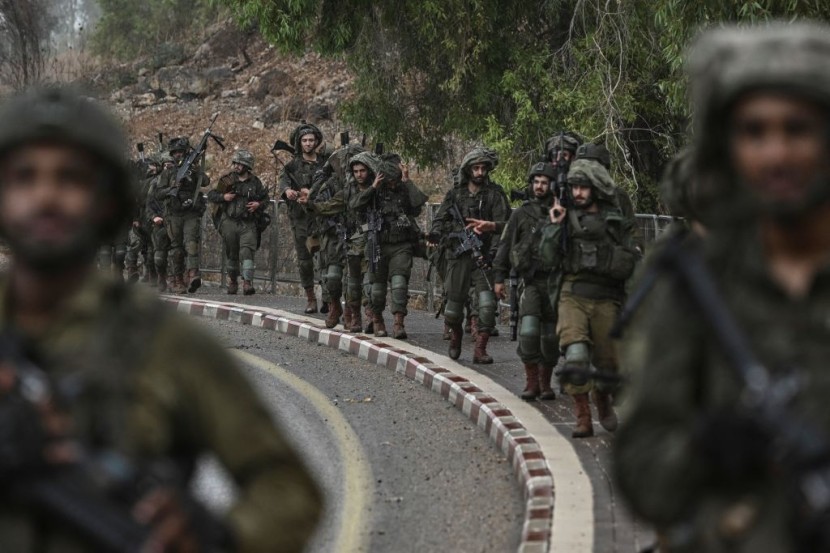
The Israeli army announced in an early Tuesday statement that Israel conducted airstrikes overnight on Hezbollah targets in Lebanon, which they referred to as "terrorist" targets.
"The Israeli army is conducting airstrikes on military targets belonging to the terrorist organization Hezbollah within Lebanese territory," the statement read, as per News18.
Israel Responds to Hezbollah's Threat
Between rising tensions and a surge in violence in the Middle East, the global community is captivated by the looming threat of a conflict that can potentially engulf the entire region.
The first significant bombing sorties, involving Israeli strikes, came on the heels of reports in the Daily Express highlighting the looming threat of an escalating cross-border conflict with the potential to spread throughout the Middle East and beyond.
This ominous forecast is now turning into a grim reality. The immediate trigger for the Israeli strikes was a series of anti-tank rockets fired by Hezbollah, the Shiite Muslim militant group known as the "Party of God."
Hezbollah holds political power in Lebanon, shares its borders with Israel to the north, and enjoys support from Iran. This exchange of fire represents one of the most severe clashes outside of Gaza since the declaration of war on Hamas following their murder spree on October 7.
As tensions escalated, sirens blared over Tel-Aviv, central Israel, and Jerusalem, signaling rocket attacks from Gaza. The Israel Defense Forces (IDF) continued a robust publicity offensive on social media, labeling Hamas a "genocidal terrorist organization" and vowing to "eliminate" it.
Heart-wrenching images of communities devastated by acts of terrorism served as a stark reminder of the human toll. In this volatile environment, Israeli national security adviser Tzachi Hanegbi warned Hezbollah against initiating a war on a second front, threatening the "destruction of Lebanon" if such a conflict erupted.
Israeli Prime Minister Benjamin Netanyahu also clarified that Israel was prepared to take intense action to protect its people. He declared, "Hamas thought we would be demolished. It is we who will demolish Hamas," according to Daily Express.
Read Also : China Takes Neutral Stance in Israel-Hamas Conflict Amid Efforts To Gain Influence in the Middle East
Netanyahu Contemplates Full-Scale Military Operation
Following the disturbing outbreak of violence, Netanyahu has described the situation in Gaza as reaching a critical moment and has indicated the possibility of a complete military operation. As the condition deteriorated, residents of 28 towns near the Lebanese border were compelled to flee following these orders, which resulted in mass evacuations.
The United Nations has issued a grave warning, emphasizing that Gaza's 2.3 million residents currently face the looming threat of death. Despite international calls for calm, Netanyahu has amassed 400,000 battle-ready soldiers on the border, underscoring Israel's preparedness for a protracted conflict.
The potential for this violence to draw in other regional players, particularly Iran-backed Hezbollah and neighboring nations like Syria, is a grave concern. Colonel Richard Kemp, a former British Army commander renowned for his expertise in zones of war, underscored the high probability of a significant impact throughout the region.
Iran, known for its track record of providing training, funding, and weaponry to numerous militant groups, has been implicated in the ongoing surge of aggression. Kemp highlighted the hazardous landscape in Gaza that Israeli forces could face, characterized by explosive booby traps, ambushes, and snipers, often situated near civilian infrastructure.
Iran's involvement in the conflict is no secret. The country has trained, funded, and directed groups such as Hamas, Islamic Jihad, and Hezbollah and has declared its intentions to annihilate Israel.
Iranian Supreme Leader Ayatollah Ali Khamenei's inflammatory statements have further escalated tensions, blaming Israel for the current crisis. While the primary focus has been on the clashes in the south, shocking footage emerged showing brutal attacks on female Israeli soldiers by Hamas terrorists.
The situation in the Middle East remains highly volatile, with the potential for further escalation and the involvement of multiple actors. The call for the international community to diligently address the escalating tensions and seek a viable solution for peace and stability in the region has been emphasized.
It arises from the concern that the ongoing crisis has already claimed lives and could potentially draw in more nations. The possible long-term impact of the continuing violence is causing concern among experts, who stress the critical importance of achieving a peaceful resolution to this crisis, AP News reported.








